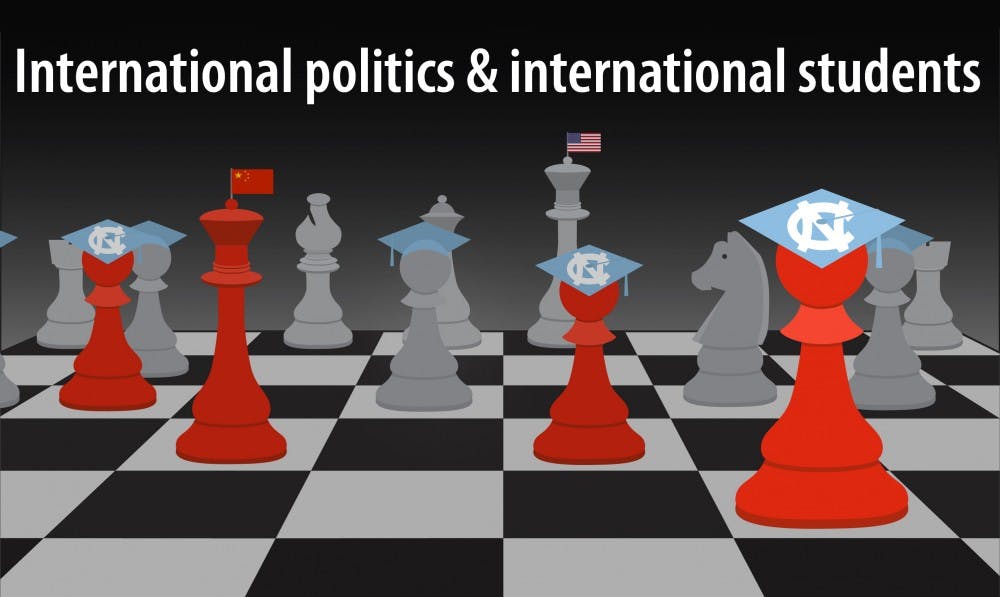When Song was stopped at customs upon entering the U.S., he wondered if it had to do with his status as a Chinese national. According to Song, the customs official marked him for referral, and he had to wait while his visa was checked.
“The time was just right for me to miss my next flight,” Song said.
UNC's stake in the trade war
Increased scrutiny of Chinese visa applicants has trickled down from the federal government to the education sector in reaction to China’s status as a rising power on the global stage, said UNC history professor Klaus Larres.
“The U.S. government — and many European governments — are deeply worried that the Chinese will take over global leadership in certain technological areas, that the West will fall behind,” Larres said.
As China grows stronger, once-dismissed concerns over espionage and intellectual property theft have risen to the forefront. In reaction, the U.S. government is focusing in on the idea that Chinese nationals are using academia as a way to make off with intellectual property, Larres said.
“Five years ago we thought that (intellectual property theft) was an accidental oversight,” Larres said. “Now we wonder, is there someone deliberately fishing and finding loopholes to steal stuff? So we simply have to be more careful.”
Larres cautioned that increased tensions will lead to fewer exchanges and engagement between the two countries, as well as a decrease in scholarly cooperation in the humanities, social sciences and natural sciences. He believes the only way to overcome these issues is through continued engagement.
Robin Visser, associate chairperson of the Department of Asian Studies, said that increased suspicion could not only hurt students and scholars looking to come to the U.S., but also those who are already here, including professors at UNC.
“In our department, we hire many faculty with international visas,” Visser said. “The amount of work, alone, and uncertainty for our faculty with their visa status has just been a huge source of stress, and frankly, inequity.”
International faculty can face structural disadvantages in getting promoted, Visser said, due to problems such as slowness in getting other types of visas, which she said “introduces a lot of inefficiencies into higher education.”
Visser said that Chinese students, not just faculty, are also feeling the effects of increased scrutiny in the U.S.
To get the day's news and headlines in your inbox each morning, sign up for our email newsletters.
“The feedback they get from non-Chinese students, it might create some paranoia in them,” Visser said.
Junior Patricia Pan, who is president of the Friendship Association of Chinese Students and Scholars, said she knows a rising freshman who had already missed a week of classes at UNC because her visa was not approved in time.
Pan, who studies biology and neuroscience, worries that she could miss out on medical school in the future.
“If I get into med school and I need to prolong my visa, what if it doesn’t get approved?” Patricia said. “Everybody here, pre-med students, dream to get into med school. What if (the visa) is that one missing brick that causes the whole wall to collapse?”
Maggie Jensen, graduate affairs coordinator for the physics and astronomy department, said that a Chinese graduate student in the Department of Applied Physical Sciences had missed all of orientation because her visa required a hundred day wait time.
“From my experience, it’s never that late,” said Jensen, who has been with the University for six years. “I’ve never had a student miss the first day of classes or orientation due to visa issues, from China.”
The graduate student declined to comment and called her eventual visa acceptance a “tortuous but fortunate process” in an email to The Daily Tar Heel.
Some departments, like physics and astronomy, have noticed a drop in Chinese applicants.
“In our department specifically, we’re having less Chinese applicants in general,“ Jensen said. “We always are wondering if that’s because of new restrictions or U.S.-China relations. We don’t know for sure.”
Roadblocks facing international students
Other students, like Boyu Xue, a senior studying physics and mathematics, said that it’s not just visas and increased suspicion that drives students away from American universities. Currency exchange rates, Xue said, act as another detrimental effect of the trade war on his international student experience.
Developments in the trade war have led to a drop in the value of the Chinese yuan. In February 2019, 6.70 yuan could be exchanged for one dollar. As of Sept. 10, the exchange rate is 7.12 yuan to a dollar. This difference, multiplied over the more than $57,000 international students have to pay for tuition and other fees, can have a big impact.
Xue also said Chinese students like himself will miss out on consideration for certain opportunities in the U.S., such as working with certain technologies.
“Sometimes we get many emails with information about internships in the summer, including in the U.S. military or the Army or nuclear research centers, but they have a clear requirement that citizens should apply,” Xue said.
Brandi Day, the diversity coordinator for the computer science department, said that international students have a hard time getting summer internships because they need visa sponsorship. She said that by the time employers get their H-1B visas, the official name for temporary work visas in the U.S., “it just isn’t worth it” for employers.
“So sadly, a lot of our graduate students, I know for a fact, don’t get the same opportunities in terms of internships, just because of this bureaucracy with the H-1B visa,” Day said.
For students who must complete an internship for the Masters or Ph.D., visas are a stumbling block, she said.
Because of these problems, Pan, Song, Larres and Visser said they had heard that Chinese students were considering going to other countries for college.
“I have more friends who are now preferring to go to Canada,” Pan said. “It’s just more ‘user-friendly,’ as you would say.”
special.projects@dailytarheel.com



